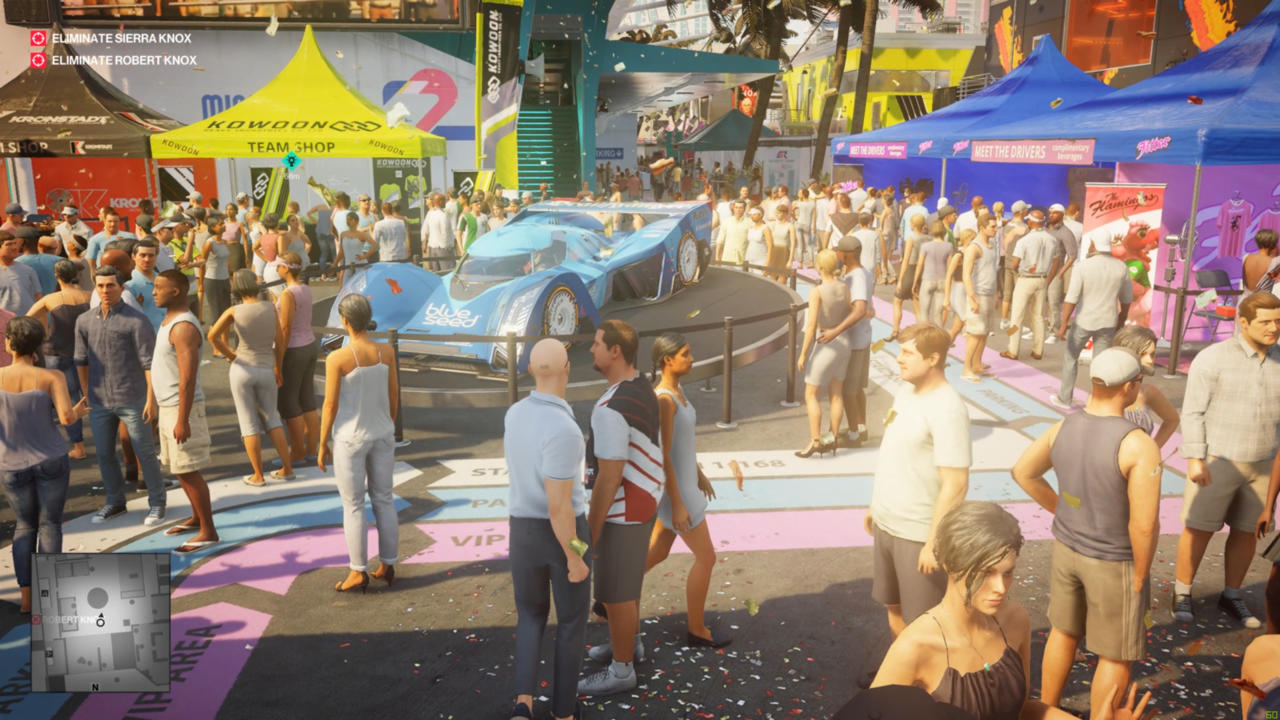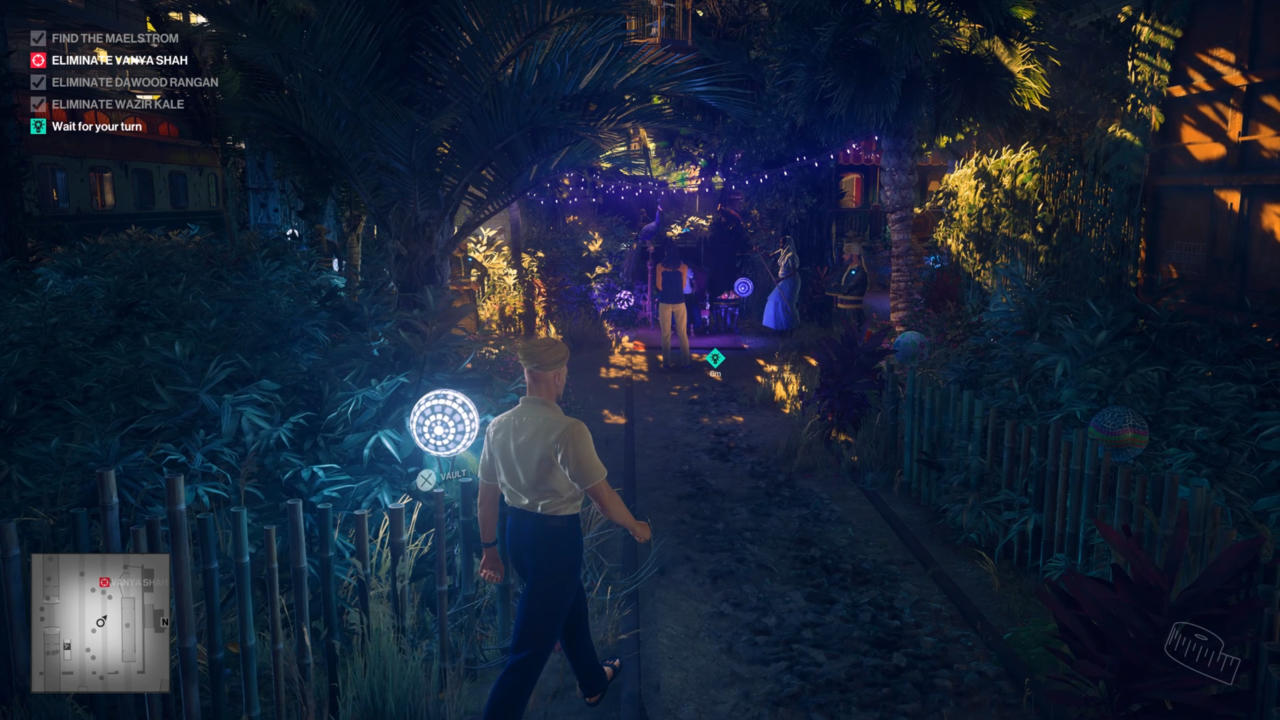Hitman 2 is out now on PC, PS4, and Xbox One. The game's first Elusive Target, the first part of IO's free post-launch support plans, is currently active and features actor Sean Bean as an MI5 agent gone rogue named Mark Faba. Read on for our full review, originally published on November 8.
Hitman is a game about killing people. Well, killing specific people and trying not to kill other people unless you really have to. But it's also a game about exploring large, real-world-inspired spaces, learning about how they operate, finding multiple solutions to problems, and using that knowledge to improvise and manipulate the environment to hit the people you're hunting. The episodic nature of the Hitman refresh in 2016 saw IO Interactive release one level every month--a contentious move at the time, but one that helped accentuate the potential in each mission. Hitman 2 ditches the episodic model and adds a few new minor mechanics, but the loop of continuously replaying a single location, slowly uncovering the wealth of possibilities, and being able to effectively draw upon that knowledge in new challenges is where Hitman is strongest.

Hitman 2 takes you to six new locales, and each poses unique situations to overcome as you attempt to assassinate your targets. Mumbai is a standout with its densely populated streets and labyrinths of tenement buildings--a great environment that makes the most of a new Assassin's Creed-style crowd blending mechanic, allowing you to disappear into big groups of people. A mission in Miami, Florida takes place at an active raceway, a loud and vibrant stage that feels like a theme park with its swaths of attendees, distinct zones, and a concealed backstage underbelly.
These levels are overwhelming in the best way possible, and it's exciting to begin peeling away the layers of these large, intricate areas--exploring the spaces, discovering routes, finding tools and disguises, and figuring out the best places to utilize them. If you're familiar with Hitman, you know that each stage and its AI inhabitants run on routines like clockwork, making Hitman a game that rewards social stealth and patience. Eavesdropping, tailing, and passive observation are good first steps to success. Even the Whittleton Creek stage, a small, sparsely populated suburban block in Vermont, feels like a mindmap of interconnected causality when you begin to dig deeper. Having the curiosity to uncover how things operate within levels, stumbling upon minor plotlines and amusing flavor dialog along the way, is interesting in its own right.
Hitman does make an upfront effort to help focus your scope and give you some momentum toward your objectives, though thankfully your initiative is still necessary to solve some predicaments. Stumbling across a Mission Story (previously known as Opportunities) might lead you to a machine you can sabotage, for example, but you need to find the tool to do so and work out the best method of either distracting or dispatching the people around it.
Mission Stories are a great first step, but Hitman becomes its best when you start to internalize the stages and uncover the more obscure ways things can unfold in subsequent playthroughs, be it through pursuing alternative Mission Stories, Challenges that ask you to perform specific tasks, or your own improvisation. There are few fail states other than your own death, and there are so many approaches and tools at your disposal that the path to victory can be as creative and elegant or as bumbling and messy as it needs to be. Completing a stage typically takes a long time, and there will be plenty of moments when a guard catches you doing something you shouldn't be doing and calls for backup. Unhinged gunfights still feel as futile as ever, but when things get out of control there's almost always the opportunity to escape to a less hostile part of the level, swap your disguises, and come up with an alternative "make do" approach. In fact, Hitman is sometimes more exciting when your initial plans fail.

The only problem with being presented with such a staggering array of interactions is that the limitations of the sandbox will eventually reveal themselves if you push the wrong way. For example, while you can stash bodies in dumpsters and closets, I was disappointed to discover I couldn't stash them in one of many vacant portable toilets. While Agent 47 can leap tall fences and shimmy across daringly high ledges, he seemingly can't muster the courage to drop down from certain first-floor balconies. Guard AI behavior is stern but generous--if you're found trespassing in a restricted area they'll give you a chance to find the exit before reacting, but sometimes it's too generous. I was amused to see a target's personal bodyguard decide to go home for the day after his employer "accidentally" fell off a building, even though I was the only other person in the room.
Hitman 2 continues to embrace a trial-and-error playstyle in its campaign. The levels are long, but autosaves are generous and manual saving is encouraged, which gives you the freedom to experiment with different ways of approaching a problem. And the closer you get to bending the systems in just the right way--trying to narrowly squeeze past a guard's sightline from different directions, or using coins and cheeseburgers to divert someone's attention--the more thrilling it feels, no matter how goofy it actually looks. Hitman 2's interstitial cinematics are as grim and dramatic as a British espionage drama, and it's hard not to let yourself buy into the clinical overarching conspiracy. But in the field, the series' tongue-in-cheek absurdity happily remains with ridiculous costumes, unlikely weapons, and Agent 47's self-aware deadpan acting, which perfectly accompanies any bumbling improvisation. Both exist distinctly, don't really compliment or detract one another, but are still enjoyable in their own right.
Hitman 2 also boasts a few significant modes outside of its campaign, including Sniper Assassin, which adapts the design seen in the Hitman: Sniper smartphone game and tasks you with taking out a series of targets from a single vantage point using only a scoped rifle. It's a straightforward but enjoyable, low-stakes mode that allows for a surprising amount of creative freedom, and it can be played in two-player online co-op. But Hitman 2's most enticing bonus, at least if you own the previous Hitman, is the ability to download the original stages into Hitman 2, which gives you feature-complete versions of them with the addition of new mechanics like functional mirrors (which enemies can spot you in) and the briefcase (which lets you conceal and transport tools discreetly), among other things. These legacy stages are wonderful to revisit under a new light.
It should also be mentioned that one of the most compelling elements of the 2016 Hitman was the continuous, free live content updates that occurred after the game's launch. Escalation Missions, where you're given specific conditional challenges of increasing difficulty, and Elusive Targets, limited-time events where you have only one chance to take out unique assassination targets, added tense trials that tested both your knowledge of levels and improvisational skills. IO Interactive has announced that these familiar features will be making a return, along with free content updates to Sniper Assassin and Ghost Mode. We obviously can't judge the quality of this content at launch, but it's surely something to look forward to.
The addition of other minor mechanical changes--like concussive weapons, a picture-in-picture enemy activity alert, and visible security camera sightlines--help to improve Hitman 2 overall as a dense and accessible stealth assassination game. But the new locations are the real stars, impressive and inventive sandboxes ripe for picking apart with exciting experiments. Hitman is about experiencing the anticipation of seeing whether a plan will work when you try it for the first time. It's about feeling the tension of briskly walking away from a bad situation, hoping you can lose the suspicious guards. It's the satisfaction of knowing the machinations of a level so well that when a target moves into a particular place at a particular time, you have the perfect way to intervene. Hitman 2 is a familiar experience, but in the Hitman world, familiarity is an incredible strength.























